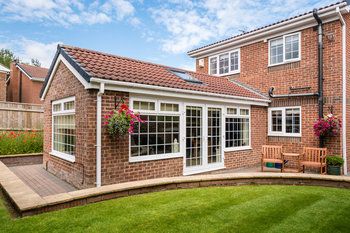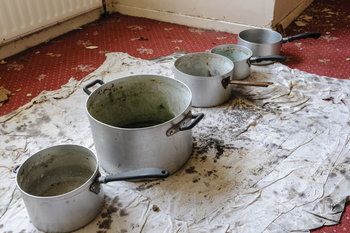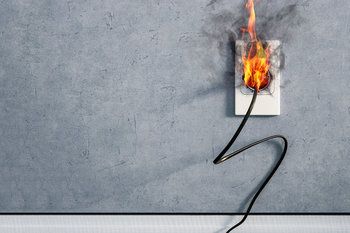 Should you buy a home in a better school district? Does it make financial sense to buy in a good school district if you don't have kids? Or, should you choose a better home in a less-well-regarded school district? Should private school costs influence your decision? This article is designed to help you decide between a better home vs. better school district.
Should you buy a home in a better school district? Does it make financial sense to buy in a good school district if you don't have kids? Or, should you choose a better home in a less-well-regarded school district? Should private school costs influence your decision? This article is designed to help you decide between a better home vs. better school district.
How schools affect home values
Most people know that there is a relationship between schools and property values. And that a home in a good school district costs more than the same home would in a bad school district. A 2016 Realtor.com survey revealed that 78% of home buyers for whom schools were a priority said that they had to make compromises when they purchased a house. For better schools, the house features most commonly given up were garages (19%), large backyards (18%), updated kitchens (17%), bedrooms (17%), and outdoor living areas (16%).
According to the New York Times, economists claim that a 5% improvement in test scores can raise suburban home prices by 2.5%. Some research even suggests that homes in good school districts hold their value better in economic downturns. But is a better school district always worth the extra cost? Or can it be smarter to buy in a bad school district?
Is a buying a home in a better school district best for kids?
If you have children and you want to provide them with the best education, you may have to make a choice: Buy a home in a better school district or buy in a less desirable district and enroll your children in private school.
To make your decision, consider the difference in home prices and the cost of private school. According to Private School Review, the average private school tuition is approximately $12,427 per year. That's $1,036 per month. If you have an eighth grader who will be in school for five more years, that's $62,135 in tuition, if fees remain the same. So compare the price of the home in a good school district with the price of a home in the bad school district plus the cost of private education for your child.
One way to do this is to simply add the private school cost to the home price and see if it's more or less than the cost of a similar home in the better school district. But that might be misleading because it does not address affordability. Depending on the mortgage rate and your down payment, financing the extra cost over a 30-year mortgage may result in lower monthly payments than the cost of private school tuition. But you also need to factor in the added taxes and insurance a more expensive home requires.
Related: Is Buying a Home a Good Long-Term Investment?
in 2018, Collateral Analytics studied school districts and differences in home prices and evaluated two very similar homes in the same neighborhood but different school districts. The home in the better school district was worth $440,000, while the one in the bad school district was valued at $290,000.
Assuming that you can put 20% down on either home and get a 6% mortgage rate, your monthly expense for the less expensive home and less-desirable school district would be:
- Principal and interest payment on $232,000 mortgage: $1,391
- Estimated property taxes and insurance based on $290,000 value: $500
- Private school tuition: $889 per month
- Total: $2,780 per month
While the costs of the more expensive home without private schooling would be:
- Principal and interest payment on a $352,000 mortgage: $2,110
- Estimated property tax and insurance based on $440,000 value: $720
- Total: $2,830 per month
It appears that buying in the cheaper neighborhood might be the right decision in this case, but not by much. Of course, if you itemize your tax deductions, the after-tax cost of the more expensive home would be lower. And if you have more than one child in school, or your child is younger, the cost of private school would be higher. So it's a very personal decision. Remember, the cost of private school goes away in a few years, but the higher cost of the home in the good school district goes on as long as you own the property.
Buying a home when you don't have children
If you don't have kids, buying a home in a bad school district can save you money and allow you to purchase a nicer house. However, many in real estate argue that it's better to buy a home in a good school district even if you don't have children because those areas tend to hold their value, and because it may be easier to sell your home when you move. There is some truth to that statement.
Realtor Ken Corsini studied real estate prices in Atlanta before and during the housing crisis of the late 2000s, and found that homes in good school districts did not experience as much devaluation as those in average or bad school districts.
And according to Realtor.com, homes in good school districts sell on average eight days faster and get 26% more online views than homes in average districts. And they retain their value as long as their schools' rating remains high.
But that, says Kevin O'Brien of UpFromWageSlavery.com is the reason buyers should consider homes in a bad school district. Because real estate is like any other investment with an efficient market. That is, information easily known about the property is already priced into it. You may get more when you sell, but you also pay more when you buy - without getting a tangible benefit if you don't have children.
Related: Buying a Home as an Investment Property
More importantly, there is a risk with homes in good school districts that those in bad school districts don't have - the chance that the school's ratings could drop, and local home values with it. Other factors that can impact home values in good school districts include government policy (school choice, property taxes, school spending) and demographics. (Millennial buyers, for instance, exhibit a strong preference for city centers over suburban areas, regardless of school quality.)
"Think about it this way," Obrien says in his blog, "If you pay a premium for what is already considered the best, there is not a lot of upside potential, but there is plenty of opportunity for your investment to remain stagnate or go downhill. On the other hand, if you buy in an average or poorly performing district, there are many different factors that could improve your local school outlook and real estate value."
Finally, property taxes tend to be significantly higher in areas with excellent schools. Those who live in towns with great schools generally pay more in taxes for them.
Homes in good school districts don't always cost more
Don't despair if you have lots of kids and private school is out of reach. It can be wrong to assume that neighborhoods with the best schools always cost more. Sometimes the suburbs, which tend to have the higher-ranking school districts, are cheaper as well.
In their article entitled "Good Schools, Affordable Homes: Finding Suburban Sweet Spots," New York Times reporters Quoctrung Bui and Conor Dougherty claimed that, "in some areas - particularly a handful of dense cities with good public transit - the preference for being in the city center seems to outweigh the importance of school quality by a huge margin. Homes in central city locations are generally more valued than those farther out, and prices in the urban locations have risen far faster than in the suburbs since 2000."
Related: Buying a Home (Dos and Don'ts of a Home Purchase)
The Brookings Institute also found that good schools don't always command a huge premium. In areas where zoning is "less exclusionary," for example where vouchers can be used, or where high-ranking charter or online schools are available, the home price gap between a better school district and a "bad" school district is smaller.
Finally, many researchers admit that the home price difference between better school districts and lesser districts is probably not entirely due to the schools themselves. For instance, affluent homeowners prefer better schools, so more expensive homes are built near these schools. And these areas tend to have other things people want and are willing to pay for - walkability, public amenities like nice parks, cultural facilities, restaurants and shopping, and less crime.
So it pays to investigate school districts and home values before making assumptions. If you're willing to move your family to the suburbs, you may find that access to good schools doesn't cost you more. This is especially true in areas where good schools are the norm rather than the exception.
Mortgage rates can affect whether you can buy in a good school district. Check today's mortgage rates.
This article was updated by Keith Gumbinger.



